Archaeologists in Turkey have made an exciting discovery of a rare fifth-century Christian pendant featuring King Solomon defeating the devil. This unique pendant, found in Anatolia, is the only one of its kind discovered in the region to date. The bronze pendant showcases King Solomon on horseback spearing the devil, with inscriptions in ancient Greek on both sides.
The pendant is believed to have been used as an amulet, serving as a charm to protect against evil or danger. According to Ersin Çelikbaş, an archaeologist at Karabük University in Turkey, the pendant symbolizes religion and power. It features inscriptions that translate to “Our Lord defeated evil” on one side and the names of four angels on the other side.
While King Solomon is a prominent figure in the Hebrew Bible, there is limited archaeological evidence to support the biblical accounts. Despite this, Çelikbaş is confident that the artifact is a Christian pendant, highlighting the importance of King Solomon in various religions. The discovery sheds light on the significance of the artifact for Anatolian archaeology.
The pendant was uncovered during excavations at Hadrianopolis, an ancient settlement in Paphlagonia, a region in north-central Turkey along the Black Sea coast. The site, named after the Roman emperor Hadrian, was rebuilt during the Early Byzantine period and features various structures such as baths, churches, fortifications, and villas.
The archaeologists believe that the pendant may have belonged to a cavalry soldier, given the presence of a cavalry unit in Hadrianopolis. The artifact is dated to the fifth century, during the Byzantine Empire’s rule over the region. Çelikbaş speculates that King Solomon may have been considered a protective figure for the Roman and Byzantine cavalry in Hadrianopolis.
While this pendant is the first of its kind discovered in Anatolia, a similar artifact was found in Jerusalem, indicating the religious significance of Hadrianopolis in ancient times. The pendant is currently in Çelikbaş’s lab and will eventually be transferred to a museum for exhibition.
This fascinating discovery offers valuable insights into the religious and military practices of the Byzantine Empire in Anatolia. The symbolism of King Solomon defeating the devil on the pendant highlights the belief in the power of faith and protection against evil during ancient times. The archaeological findings at Hadrianopolis continue to unravel the mysteries of the region’s rich history and cultural heritage.




